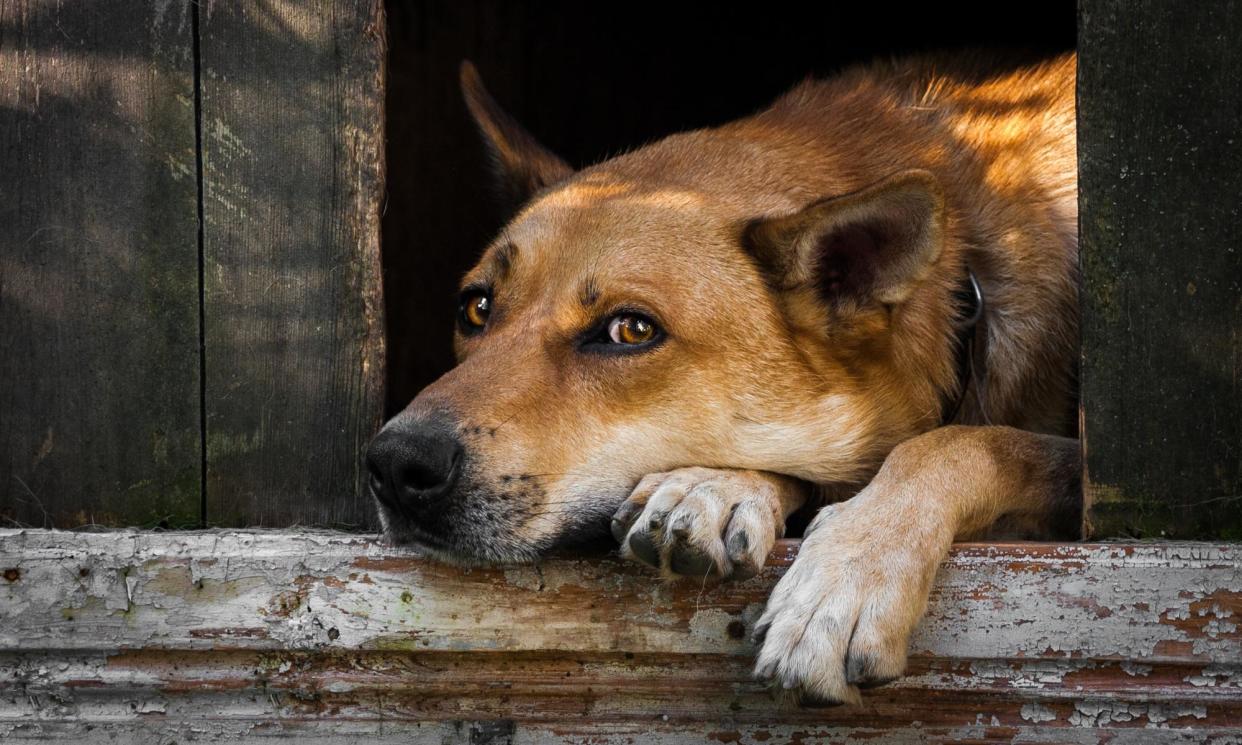Poem of the week: The Night Hunt by Thomas MacDonagh

The Night Hunt
In the morning, in the dark,
When the stars began to blunt,
By the wall of Barna Park
Dogs I heard and saw them hunt
All the parish dogs were there,
All the dogs for miles around,
Teeming up behind a hare,
In the dark without a sound.
How I heard I scarce can tell –
’Twas a patter in the grass –
And I did not see them well
Come across the dark and pass;
Yet I saw them and I knew
Spearman’s dog and Spellman’s dog
And, beside my own dog too,
Leamy’s from the Island Bog.
In the morning when the sun
Burnished all the green to gorse,
I went out to take a run
Round the bog upon my horse;
And my dog that had been sleeping
In the heat beside the door
Left his yawning and went leaping
On a hundred yards before.
Through the village street we passed –
Not a dog there raised a snout –
Through the street and out at last
On the white bog road and out
Over Barna Park full pace,
Over to the Silver Stream,
Horse and dog in happy race,
Rider between thought and dream.
By the stream, at Leamy’s house,
Lay a dog – my pace I curbed –
But our coming did not rouse
Him from drowsing undisturbed;
And my dog, as unaware
Of the other, dropped beside
And went running by me there
With my horse’s slackened stride.
Yet by something, by a twitch
Of the sleeper’s eye, a look
From the runner, something which
Little chords of feeling shook,
I was conscious that a thought
Shuddered through the silent deep
Of a secret – I had caught
Something I had known in sleep.
The author of this week’s poem, Thomas MacDonagh, was born in Cloughjordan, County Tipperary, in 1878. Poet, playwright, teacher and leading republican revolutionary, MacDonagh wrote two critical studies, the second of which, Literature in Ireland, published posthumously in 1916, has been recognised as a significant work of the Irish Literary Revival, and one with a visionary reach that extends to the present day.
“It is … by its colloquial directness that you will know the true Irish work,” MacDonagh wrote, adding by way of warning, a funny and pertinent example of what he called “Irish shams”: “’Tis out and out humbugs they are surely.” His vision of what he called the “Irish mode” in Anglo-Irish poetry was of the patterning and rhythms of Irish entering English verse, cross-fertilising the idioms of both and creating the voice of Irish authenticity.
MacDonagh gets close in his English translations from the Gaelic, most famously in The Yellow Bittern (An Bonnán Buí). In his original poems in English, the diction more often suggests late-Victorian Romanticism, elevated by apostrophes and exclamations that may reflect a too-little examined classical influence. There are exceptions, though, and The Night Hunt, set in the Cloughjordan of his early years, is one of them.
MacDonagh’s imagination is very much at home, and looks it and sounds it. The “colloquial directness” he recommends in Literature in Ireland is achieved without awkwardness; it works beautifully with the easy flow of the trochaic tetrameter line and regular rhyme-scheme.
The need for a rhyme with “hunt” gets the poem off to a good start: the early-morning stars don’t “fade” but “beg[in] to blunt”. So far so good. Less noticeable but also refreshing combinations continue throughout the poem: “dog/Bog”, “gorse/horse”, “twitch/which” are some of them.
“Dogs I heard” (line four) is perfectly natural in colloquial English: it’s an inversion but not a fusty one. There’s a neat pun in “teeming up” (“teaming up”) as the dogs gather to give chase to the hare. From this first reference to Barna Park, proper nouns of place and person will stud the poem like homely lights in a dark landscape.
The narrative unfolds at a bounding pace. Spearman’s dog and Spellman’s dog join the pack. At this point I began to wonder about allegory. Might Thomas MacDonagh, revolutionary and writer, identify conflicted selves by these names?
Simply as a humorous, knowingly fanciful narrative, the poem is no less an achievement. It’s alert to the energies of small words and large dogs, and if the dogs have a figurative part to play, if they embody the subconscious will to resistance and revolution, it’s only by the lightest “twitch” of a possibility.
No proof of the actuality of the hunt emerges, but the speaker’s dog and Leamy’s dog exchange significant glances, and the speaker is attuned to the “little chords of feeling”, the sensed human ability to know something instinctively but without full consciousness. Perception becomes a shared capacity between the species.
I can’t judge specific Irish influences on the Night Hunt’s diction. Clearly, though, there’s not a “sham” colloquialism in sight. In this poem of 1911-12, it seems the astute critic and translator has found his own track towards the poetics of the Irish mode. His poetry was still only a work in progress when he died, executed by the British for his leading role in the Easter Rising, on 3 May 1916.
• James Stephens’ commemorative edition of MacDonagh’s poems from 1916 offers a broader view of the poet’s work.


